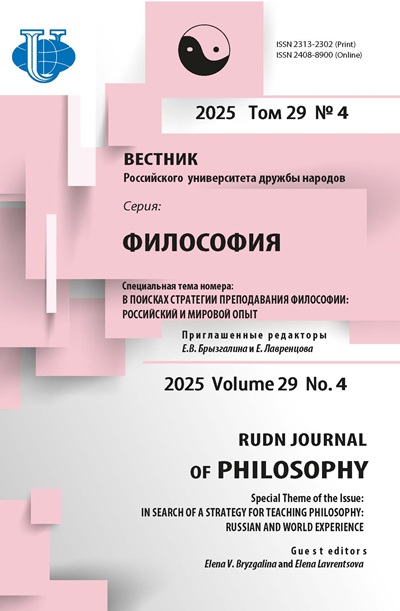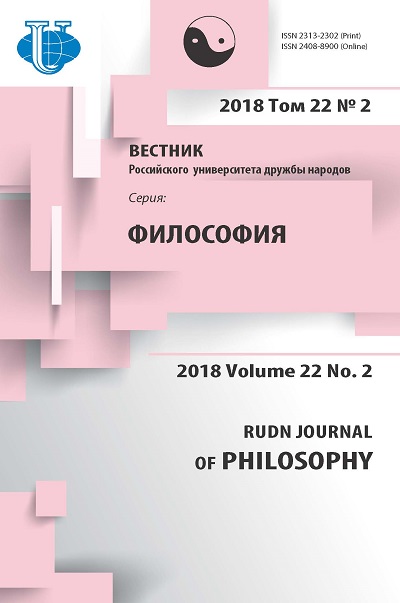Россия как особенная форма всеобщности христианского мира: к вопросу о диалектике взаимодействия русского и европейского духа
- Авторы: Бойко П.Е.1, Бухович Е.В.1
-
Учреждения:
- Кубанский государственный университет
- Выпуск: Том 22, № 2 (2018)
- Страницы: 217-225
- Раздел: ИСТОРИЯ ФИЛОСОФИИ
- URL: https://journals.rudn.ru/philosophy/article/view/18716
- DOI: https://doi.org/10.22363/2313-2302-2018-22-2-217-225
- ID: 18716
Цитировать
Полный текст
Аннотация
Основное содержание статьи посвящено анализу спекулятивной (гегелевской) диалектики соотношения Европейского мира и России как всеобщего и особенного моментов христианской идеи. Обращаясь к всеобщей диалектике исторического процесса, авторы развивают мысль о том, что в своем движении к конкретной всеобщности христианской идеи «европейское человечество» (Гуссерль) с необходимостью обнаруживает внутри себя свою собственную отрицательность, «свое иное» (Россия). Через это Иное европейский дух опосредует себя, снимает момент абстрактной всеобщности рассудочного рационализма Просвещения («modernity», «индустриализм»), вступая в «постисторическую» эпоху конкретной всеобщности единой христианской постиндустриальной цивилизации. Этим «своим иным» духовной Европы (или Запада в целом) является Россия, историческая судьба которой была связана с усвоением восточнохристианской духовности (Россия как «поствизантийская» составляющая единого европейско-христианского человечества), усвоением достижений великой европейской культуры. Постигая европейский дух, Россия, в то же время, постоянно находилась в военно-политической и идейной «борьбе с Западом», начиная от столкновения с тевтонскими рыцарями XIII века или польскими интервентами начала XVII столетия и заканчивая «холодной войной» и современным украинским кризисом. В статье также проводится мысль о том, что в настоящее время вышеуказанная диалектическая отрицательность Европы и России достигла своего предельного напряжения и вплотную подошла к своему духовному преодолению (снятию, примирению, отрицанию отрицания) из себя самой. Результатом этого процесса должна стать действительная универсальная Европа, внутри которой Россия, наконец, сумеет обрести свое «положительно-разумное» место.
Об авторах
Павел Евгеньевич Бойко
Кубанский государственный университет
Автор, ответственный за переписку.
Email: pboyko@mail.ru
доктор философских наук, доцент, заведующий кафедрой философии ФГБОУ ВО «Кубанский государственный университет»
ул. Ставропольская, 149, Краснодар, Россия, 350040Евгений Викторович Бухович
Кубанский государственный университет
Email: yevgenybukhovich@gmail.com
аспирант, преподаватель кафедры философии ФГБОУ ВО «Кубанский государственный университет»
ул. Ставропольская, 149, Краснодар, Россия, 350040Список литературы
- Бердяев Н.А. История и смысл русского коммунизма. М., 1990.
- Гаврюшин Н.К. Этюды о разумной вере. Минск, 2010.
- Гегель Г.В.Ф. Феноменология духа. М., 2000.
- Гуссерль Э. Кризис европейского человечества и философия // http://anthropology.rchgi.spb.ru/ husserl/husserl_s4.htm.
- Интервью с Евгением Семеновичем Линьковым (2008) // Philosophia perennis MMVIII. Альманах Санкт-Петербургского общества классической немецкой философии. СПб.: Изд-во Политехн. ун-та, 2008. С. 215-228. Режим доступа: http://www.smyrnyh.com/ ?page_id=141).
- Иустин (Попович), преподобный. Православная философия истины. Пермь, 2003.
- Киреевский И.В. О необходимости и возможности новых начал для философии. СПб., 2006.
- Крстич Даниил, епископ. В начале был смысл. СПб., 2010.
- Линьков Е.С. Лекции разных лет. Т. 1. СПб., 2012.
- Линьков Е.С. Лекции разных лет по философии. Т. 2. СПб., 2017.
- Мейясу К. После конечности: Эссе о необходимости контингентности. Екатеринбург - М., 2015.
- Муравьев А.Н. Философия и опыт: Очерки истории философии и культуры. СПб., 2015.
- Нибур Ричард, Нибур Райнхольд. Христос и культура. Избранные труды. М., 1996.
- Тиллих П. Систематическая теология. Т. 3. М. - СПб., 2000.
- Шеллинг Ф.В.Й. Система мировых эпох: Мюнхенские лекции. Томск, 1999.
- Яковенко И.Г. Познание России. Цивилизационный анализ. М., 2008.
Дополнительные файлы















